Why you won't hear much about the 'e word' in Beshear, Cameron race for Kentucky governor
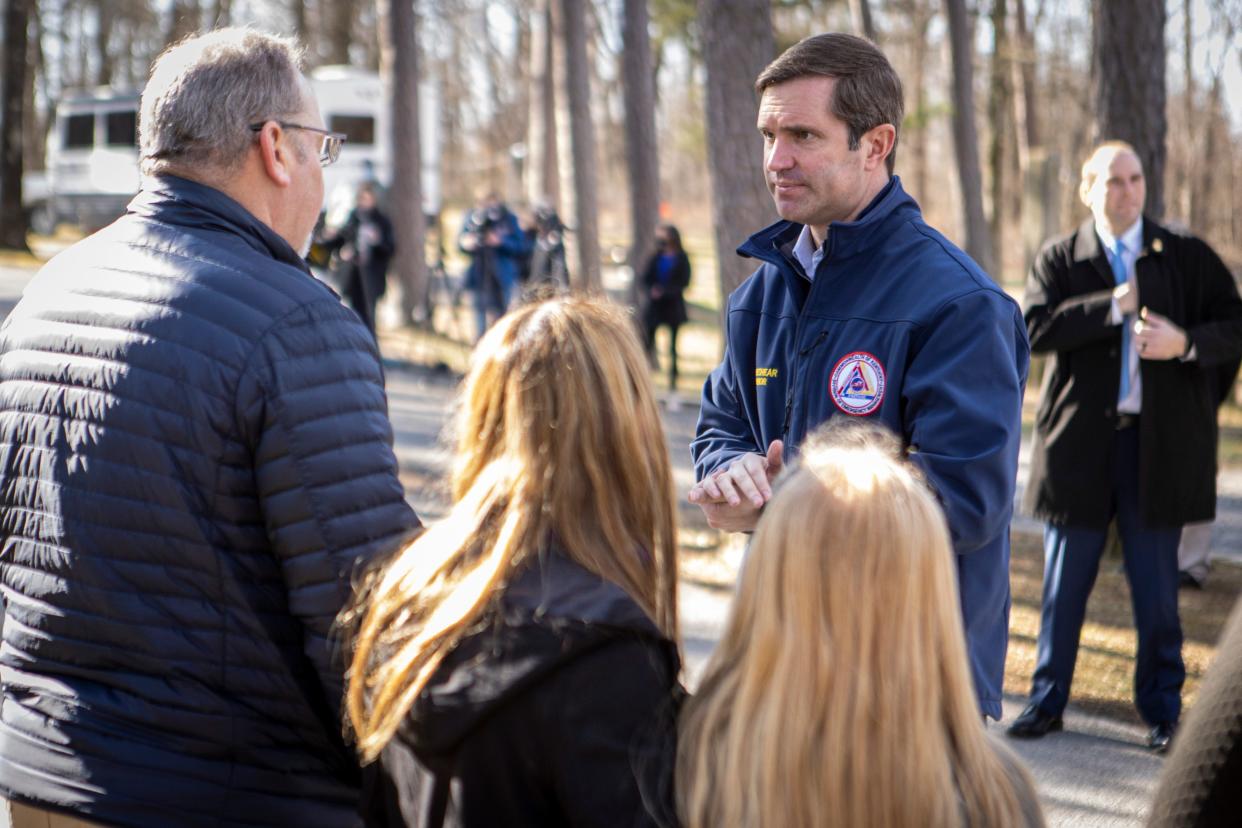
- Oops!Something went wrong.Please try again later.
- Oops!Something went wrong.Please try again later.
- Oops!Something went wrong.Please try again later.
In an increasingly contentious Kentucky race for governor, where the two campaigns jab each other on abortion access and transgender rights, the issue of the environment has largely gone unaddressed.
Gov. Andy Beshear, a popular Democrat in a deeply red state, walks a tightrope on the matter. He has acknowledged climate change, but has rarely chosen to broach the touchy subject — or the fossil fuel industry's role in it — as he looks to win a second term.
He faces Donald Trump-endorsed Daniel Cameron, whose tenure as attorney general has been marked by staunch opposition to what he calls the "radical climate agenda" of the Biden administration.
And in July, Cameron tapped Robby Mills as his running mate, a state senator who pushed legislation to protect coal-fired power plants from retirement and to divest state funds from investment firms using climate-conscious, ESG investment policies.
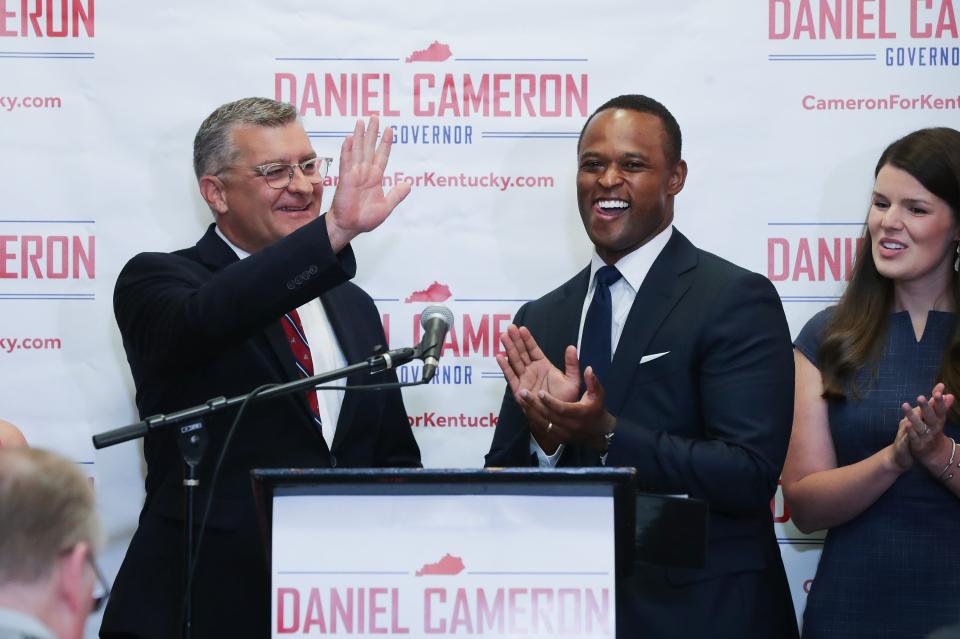
Experts warn of a rapidly closing window for places like Kentucky to shift away from fossil fuels, which last year made up 93% of the state's energy portfolio. Without a change, climate projections foresee more of the record-breaking, costly disasters seen in recent years.
“The state knows what extreme weather events can look like," said Rachel Licker, principal climate scientist for the Union of Concerned Scientists. "It's really in Kentucky's best interest to not be on a pathway in which those kinds of events become far more regular.”
Beshear's balancing act
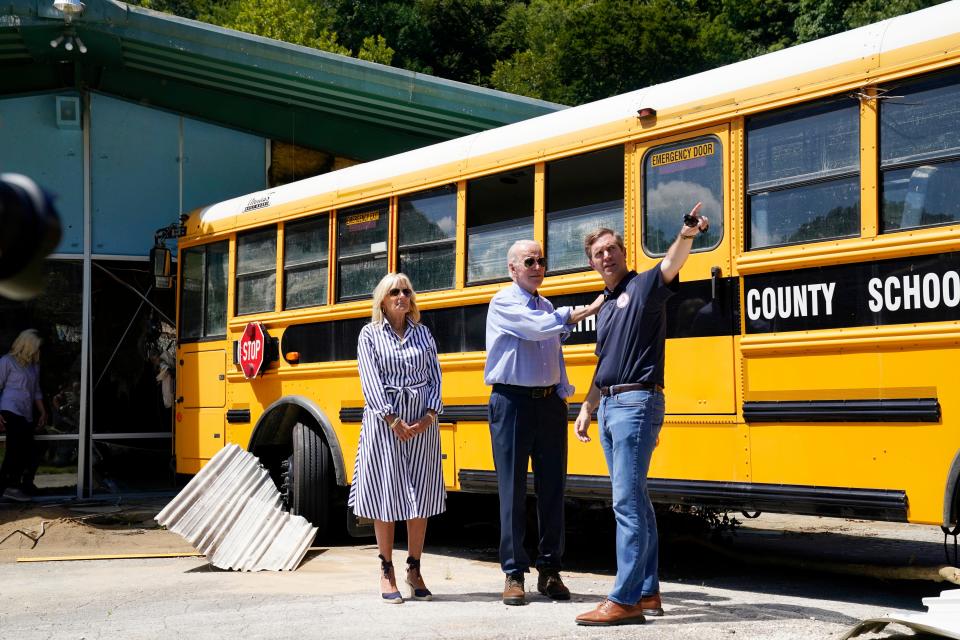
Leading the state through multiple historic disasters, Beshear's sanguine presence in times of crisis has grown familiar.
He has stood before the cameras in a windbreaker and wearily counted the roads washed away, the houses torn asunder, or the loved ones gone missing.
He has shaken hands and shared hugs with Kentuckians who've lost everything, whether to twisters in the west or floods in the east. The kind of disasters that can cause this caliber of destruction are becoming more likely because of climate change, the world’s top experts say.
Beshear has long advocated for an "all of the above" energy policy, meaning investment in both fossil fuels and renewables, despite calls for rapid decarbonization from climate scientists and environmental advocates.
It's a policy "America can't afford," according to the Environmental Working Group and other advocates of clean energy, who point to the increasing price of coal and ever-cheaper renewables, in addition to the rising costs of climate disasters for communities and infrastructure.
Republicans have harnessed the moderate "all of the above" phrase in campaigns around the country over at least the past decade, said J. Miles Coleman, an associate editor of Sabato's Crystal Ball at the University of Virginia's Center for Politics.
In Kentucky, a multi-generational sense of pride in coal mining has endured, even as the industry has continued its decline. The governor's careful choice of words has helped him dodge framing as the "anti-coal" candidate.
"Beshear has handled the coal issue masterfully," said Steve Voss, a political science professor at the University of Kentucky specializing in elections and voting behavior.
In publicizing thousands of electric vehicle manufacturing jobs coming to the state, Beshear has used phrases like "jobs of the future," signaling to voters on the left "that he's ready to see movement" on energy and climate challenges, Voss said, but "without using the language of the National Democratic Party that comes across as hostile" to the coal industry.
Many of those jobs have come, at least in part, thanks to aggressive federal incentives for electrification, and they've come in significant numbers. A battery manufacturing campus coming to Hardin County is slated to create 5,000 jobs — more than the state's entire existing coal industry.
Voters tend to care more about a general sense of job creation and a growing economy, and less about how those new jobs fit into their political worldview, Voss said. Beshear has touted 21 electric vehicle projects coming to the state since he took office, "representing more than $10.9 billion in investment and the creation of more than 10,372 full-time jobs for Kentuckians."
"He can embrace clean or renewable energy to some extent," Coleman said. "He can't just be seen as outright antagonistic" toward the state's legacy industry.
But despite the governor's moderate positions on energy and near-silence on climate change, jabs from his opposition have sought to paint him as a pawn of the Biden administration and a grim reaper for the coal industry.
Cameron and Mills fight transition, regulation
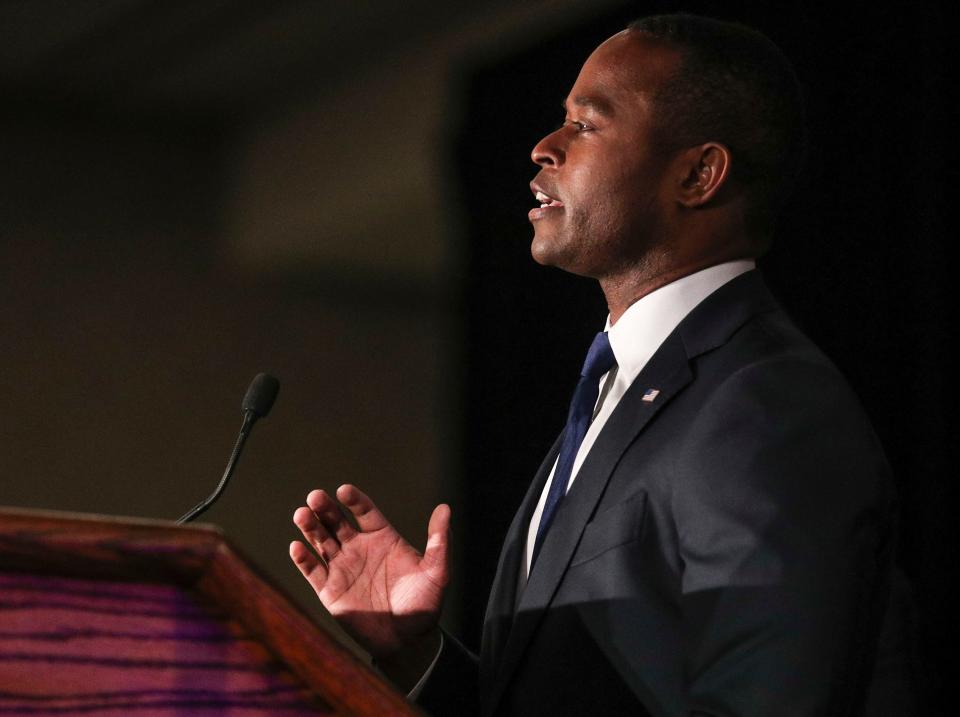
In August, Sen. Mills stood before the Public Service Commission in Madisonville, coal miners and constituents gathered behind him, and spoke against an LG&E and KU proposal to shutter multiple coal-fired generating units and replace them with natural gas and renewable energy.
He also criticized the governor for not signing his bill to keep coal-fired power plants open, which passed nonetheless.
Beshear and his administration "are controlled by radical environmentalists who want to kill coal and coal jobs," Mills said. "He says he supports coal and affordable energy, but his actions speak louder than his words. This administration has not lifted one finger to combat the radical environmentalism coming from the White House or the EPA."
But the "traditional energy sector" has had a friend in Daniel Cameron, Mills said. The attorney general's website highlights Cameron's role in pushing back against federal attempts for stricter standards for air quality, coal plant emissions, gas-powered vehicles and gas stoves.
"Rather than surrendering to climate alarmism, we must leverage the competitive advantage and economic strength provided by our God-given resources," the site says.
The Courier Journal asked Cameron's campaign whether he accepts the scientific consensus around climate change and its causes. A spokesperson returned a statement from Cameron, but did not answer that question or accommodate a request for an interview on climate, energy and environment.
"Everyone can agree on the importance of being good stewards of our environment," the statement said. "But I’m not going to do what Joe Biden and Andy Beshear want to do. Joe Biden wants to eliminate the fossil fuels industry by 2035. That would devastate our economy, and Andy Beshear has been silent on it."
Cameron focused on concerns about high energy bills, and echoed calls for a more moderate approach: "We need an all-the-above energy policy."
Coal's enduring influence
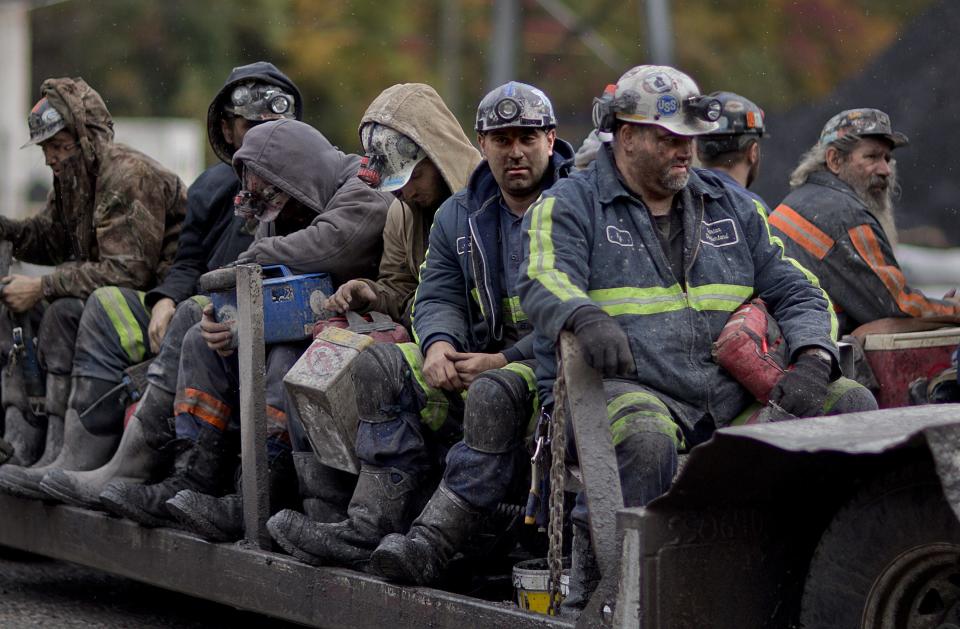
During August public meetings on LG&E and KU's proposed coal plant retirements, miners and coal country community members spoke before the Kentucky Public Service Commission in Hopkins and Harlan counties.
They shared fears of rising utility bills and an unreliable grid without coal, but also concerns about a fading industry that has, for generations, kept food on their tables.
"We're already in a poverty-stricken place," Malissa Lewis, a teacher in Harlan County, said to the commission. "Consider everything. Not just the monetary value, but the cost. The real cost of families."
"We're no longer in an environment where the politics of coal is on the lips of so many voters, let alone so many politicians," Voss said, but still, "the importance of coal as a policy issue spreads a lot wider than just coal miners."
The industry has maintained its symbolic influence on Kentucky politics, disproportionate to its shrinking size.
"It is remarkable to me, given how relatively small the industry is at this point, how much weight it seems to carry, how much above its weight it seems to punch, in Kentucky politics," said Sean O'Leary, a senior researcher at the Ohio River Valley Institute who focuses on energy and economy in Appalachia.
In early 2009, coal industry employment in Kentucky totaled more than 19,000. Since then, cheap and plentiful natural gas has grown to displace coal, encouraging utilities to close aging coal-fired plants across the nation, a Stanford analysis found.
As of the second quarter of this year, 4,631 people were employed in the coal industry statewide, according to the Kentucky Energy and Environment Cabinet — a staggering 75% decrease in about 14 years.
But last year, more than 24,000 Kentucky drivers paid for a Friends of Coal license plate, about five times more people than there are active coal workers in the state.
"It's a cultural artifact that comes with a price," said O'Leary, who grew up in a coal community in West Virginia's Northern Panhandle. He attributed rising utility bills to Kentucky's continued reliance on coal, even as utilities say maintaining aging coal-fired plants is no longer economically feasible.
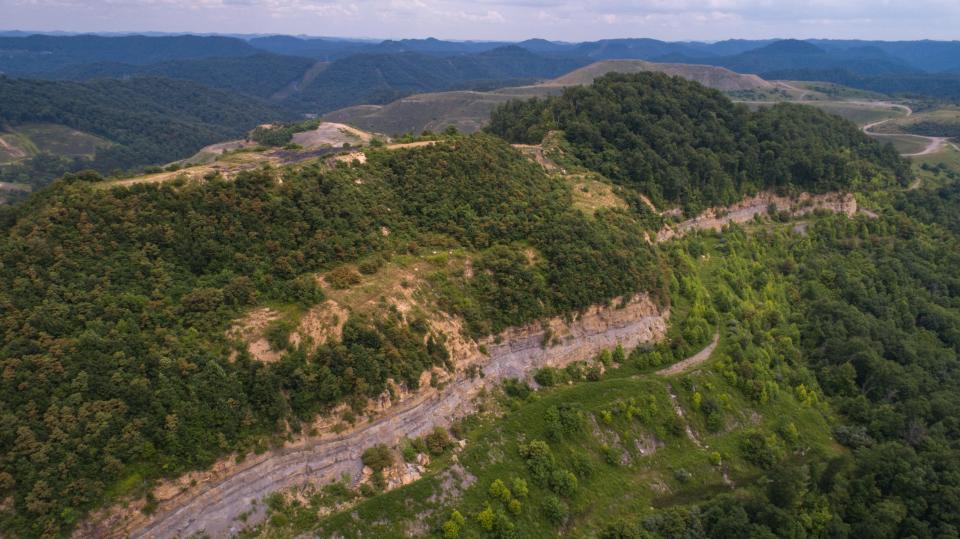
Coal workers’ pneumoconiosis, also known as black lung disease, has grown more prevalent in central Appalachia, research has shown. At the same time, communities have alleged that nearby strip mining has amplified flood damage during extreme rainfall, and insurance premiums are on the rise in parts of coal country as increasing flood risks threaten to make thousands of properties "uninsurable."
"Eventually, we know that the symbolic importance of an industry can fade," Voss said, citing tobacco's decline as smoking lost popularity.
Cameron picking Mills, a proven pro-coal legislator whose constituency lies in the state's western coal field, may not have swayed a large number of voters to his side, Voss said. But it acts as a signal to voters there, "that they're going to have a voice in the administration."
"Republicans need to remind voters in coal country why they overwhelmingly support the GOP in elections," Voss said. "Cameron needs the lopsided victories in coal country that Republicans have been able to attract lately to counterbalance the democratic tilt of voters" in the state's more urban areas.
Parallels might be drawn with right-leaning Louisiana, where Democrat John Bel Edwards has held the governorship since 2016. In parishes where the state's influential oil industry has a strong presence, Edwards wasn't the pick — but his margins were better than Biden's.
"On election night, I'll be watching Pike County," Coleman said. In addition to winning over Kentucky's suburbs, Beshear's chances will also hinge on his ability to earn votes in coal country that Biden could not.
Next governor's term a 'critical window'
Throughout its history, the U.S. has emitted more greenhouse gases than any other nation, and "every state matters," Licker said. "This decade is extremely consequential in terms of adopting measures that will get us on track to avoid the worst impacts of climate change."
A net zero roadmap from the International Energy Agency also calls this decade a "critical window" for decreasing fossil fuel reliance, and experts emphasized the role each state has in meeting those goals.
About 62% of Kentuckians believe global warming is occurring, and half of Kentuckians want their governor to do more to address it, Yale researchers estimate.
Kentucky generates less power from wind and solar than any other state, Inside Climate News has reported. One recent study estimated that every coal-fired power plant operating in the commonwealth could be replaced with renewable alternatives for less than it would cost to keep running the aging plants.
Other states, and countries, have shown momentum toward renewable energy sources as the private sector sees "the writing on the wall," said Brian LaShier, a senior Washington representative for the Union of Concerned Scientists. Without a similar movement here, "Kentucky is at risk of finding itself left behind."
But transition looks different in every state and every community, he said. It's the job of Kentucky's next governor to explore what that could look like in the commonwealth, without leaving longtime energy communities behind.
"There’s a need to move the region forward," LaShier said, "without forgetting who it was who got you there."
Connor Giffin is an environmental reporter for The Courier Journal and a corps member with Report for America, a national service program that places journalists in local newsrooms to report on under-covered issues. The program funds up to half of corps members’ salaries, but requires a portion also be raised through local community fundraising. To support local environmental reporting in Kentucky, tax-deductible donations can be made at courier-journal.com/RFA.
Learn more about RFA at reportforamerica.org. Reach Connor directly at cgiffin@gannett.com or on X @byconnorgiffin.
This article originally appeared on Louisville Courier Journal: In Kentucky governor race, environment, climate change go unmentioned

